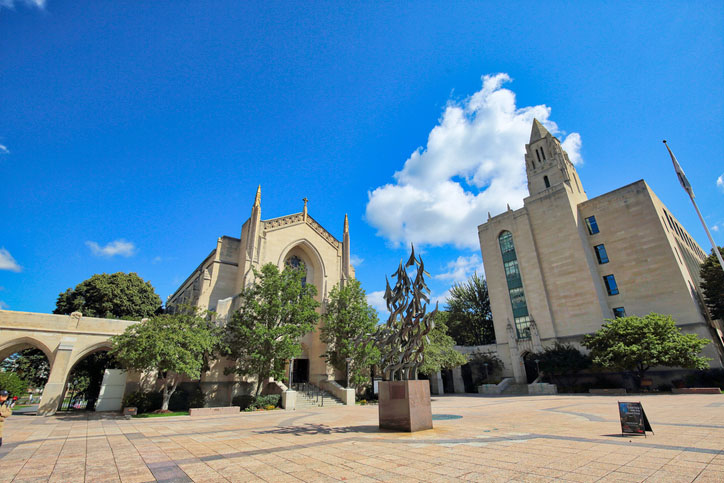
A seminary degree is a college degree offered by a religious institution of higher learning, often called a seminary or divinity school. These are most often graduate-level degree programs that are officially accredited and qualify holder for positions in faith-based organizations, churches, and non-profit corporations among others.
A seminary degree is no one single type of degree. Seminaries and divinity schools today offer an amazing and diverse array of graduate-level study programs, including:
Master of Divinity - The MDiv is considered the first professional degree for ordained ministers. It’s typically a three-to-four-year program that offers in-depth practical as well as theological instruction designed to prepare graduates for ordination as pastors in their faith, and as leaders in church or mission positions.
Explore a Christian Ministry Degree – Request More Info Today!
Doctor of Ministry - The DMin is a terminal degree in the field of ministry, designed with a professional focus in some particular area of ministry. It offers a lot of freedom in curriculum design and original research. Students are often already ordained clergy looking to perfect their professional skills for advanced church leadership or specialized practice.
PhD in Pastoral/Ministry Studies - PhD, or doctor of philosophy degrees, are seminary degrees that lean toward theoretical and academic studies in theology. They are offered in a wide range of specializations, from apologetics to pastoral counseling. But the main goal for these is to prepare graduates as researchers or professors rather than practitioners.
One thing that all seminary degrees have in common is that they are rooted in theology and religious instruction as well as having more secular classes. In fact, the seminary experience is an important part of these degrees outside of the classroom.
What are a Non-Christian Seminary Degrees?
 Although most seminaries and seminary degrees in the United States are Christian institutions, that’s not always the case. Just as Christianity has need of educating clergy and religious thinkers, so do other major world religions.
Although most seminaries and seminary degrees in the United States are Christian institutions, that’s not always the case. Just as Christianity has need of educating clergy and religious thinkers, so do other major world religions.
So it’s possible to earn seminary degrees at non-Christian seminaries as well. In some cases, these programs reflect similar types of training in practical pastoral ministry and theological studies. That’s the case at some Buddhist and Jewish seminaries, which offer Master of Divinity programs as a foundation for ministry work.
Islamic seminaries, on the other hand, pursue a very different course of study. This can be influenced by the denomination of Islam they follow. In some cases, they may even have separate types of seminaries for scholarship versus law and jurisprudence.
What Is a Seminary Graduate Trained For?
 A seminary or divinity school offers a spiritual education as well as professional instruction. In addition to explicit coursework in spiritual formation, seminary graduates have also gone through other experiences designed to drive contemplation and reflection through the course of their studies:
A seminary or divinity school offers a spiritual education as well as professional instruction. In addition to explicit coursework in spiritual formation, seminary graduates have also gone through other experiences designed to drive contemplation and reflection through the course of their studies:
- Regular individual and guided prayer
- Scheduled worship ceremonies
- One-to-one counseling
- Group discussion
Of course, there are also very specific courses in seminary degrees that drill down into professional or theoretical studies in their focus fields.
Seminary Degrees Fall Into Several Different Families
Seminary degrees most commonly fall into one of three different categories, although they may have different names depending on the specific school.
Divinity Seminary Degrees - Divinity degrees, typically the MDiv, are core first professional seminary degrees designed to prepare pastors for their duties in practical ministry work.
Ministry Seminary Degrees - Ministry degrees, offered at the master’s and doctoral levels, also offer an education in pastoral and other types of ministry. They may be more specialized and less intensive than divinity programs, offering a focus in leadership, counseling, or other pastoral skills. They may be intended as alternative pastoral preparation for denominations not requiring an MDiv for ordination, or as additional studies for already ordained pastors.
Theological Studies Seminary Degrees - Theological programs at seminaries are more focused on academic and research pursuits. They also have a wide variety of focus areas, from apologetics to ethical studies. They are offered at both master’s and doctoral levels.
Some seminaries also offer the option of pursuing dual-degree programs. These stack two different master’s degree programs together, such as an MDiv with a Master of Theology degree. They offer students the chance to expand their expertise without a lot of extra time and money pursuing the programs separately.
Denominational Seminary Degrees Make a Difference for Qualifications
Some seminaries are non-denominational, while others are rooted in a particular Christian tradition. Strictly denominational schools will offer instruction that is in line with the doctrine and interpretation of Scripture that denomination follows. Non-denominational schools offer degrees that might apply to multiple different churches. The school’s statement of faith will reveal what their beliefs and teaching reflect in their seminary degrees.
What Is a Seminary Student Qualified to Do in Christian Jobs?
 For the most part, seminaries are designed to train students for the ministry. This qualifies them to become pastors and chaplains, but job opportunities with seminary degrees do not end there.
For the most part, seminaries are designed to train students for the ministry. This qualifies them to become pastors and chaplains, but job opportunities with seminary degrees do not end there.
The kind of advanced studies that seminary degrees offer can also serve as training for all kinds of general management and leadership roles. Although they are designed to create Christian leaders, the leadership qualities themselves apply in almost any context. So you will find seminary graduates who are called to service in such roles as:
- Organization and communication coordinators
- Nonprofit fundraising managers
- Educational directors in Christian and secular schools
- Grant writers
- Executive directors in faith-based organization
Seminary degrees come with a high level of knowledge in Christian history and Scripture, which also makes them ideal preparation for individuals going into Christian education. Many private school teachers and administrators have a seminary degree behind them.
The real answer of what you will be qualified to do when graduating with a seminary degree, though, is whatever God plans for you to do. If you are called to a role where a seminary degree education is required, then He will make sure you end up in the right place to use it.









